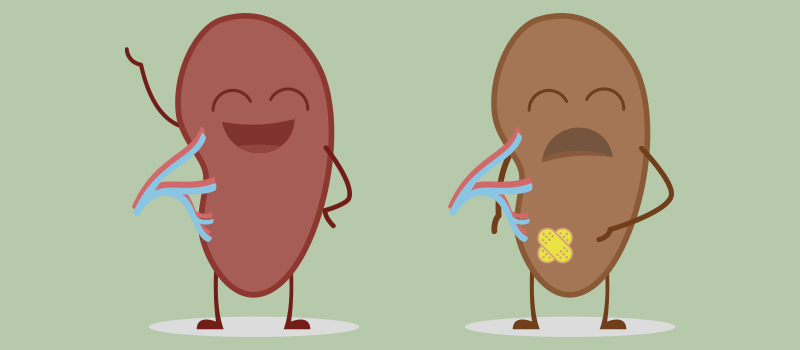What’s the Buzz
The Bee Healthy Blog
What is a Ruptured Spleen? Causes, Symptoms, & Treatment

The spleen is an abdominal organ. It bleeds easily and is one of the most easily injured organs during blunt trauma. In fact, experts estimate that 4 out of 10 blunt abdominal injuries involve the spleen. A ruptured (torn) spleen from a traumatic injury can cause life-threatening internal bleeding into the abdominal cavity. A ruptured spleen is, therefore, almost always a medical emergency in the context of the polytraumatized patient. Please continue reading to learn more about this potentially fatal condition.
Where is the spleen in the abdominal cavity?
The spleen is located in the upper left quadrant of the abdomen, inside the left rib cage, just above the stomach. A healthy spleen is an avocado-sized organ that weighs approximately 150-200 grams. It is a highly vascular organ where blood cells accumulate. Therefore, any blunt or penetrating trauma to the spleen can lead to severe bleeding and blood leaks in the abdominal cavity.
It is also worth noting that a normal-sized spleen stays entirely within the rib cage on the left side and is protected. However, an enlarged spleen can extend beyond the rib cage, putting it at increased risk of splenic ruptures from abdominal trauma.
What is the function of the spleen?
The spleen is a part of the body’s lymphatic system and immune system. It makes white blood cells and antibodies and helps the body fight infection. The spleen also plays an important role in storing blood and filtering blood of old blood cells and cellular waste. It helps to maintain fluid levels in the body.
Many conditions and diseases can affect the spleen. One of these is a ruptured spleen due to splenic injury. If you don’t get a ruptured spleen diagnosed and treated promptly, it can lead to severe bleeding and prove fatal.
What can cause spleen injury?
The most common cause of a ruptured spleen is blunt abdominal trauma, i.e., a forceful blow to the left upper abdomen or left lower chest. This can occur during contact sports, car crashes, and fistfights, for example. A splenic rupture can occur soon after a splenic injury. However, there can also be a delayed rupture and life-threatening bleeding several weeks later.
An enlarged spleen can rupture even with less forceful blunt trauma. Various conditions like infections, liver disease, and blood cancers can lead to an enlarged spleen.
Besides spleen rupture due to physical trauma, some people experience a spontaneous splenic rupture. However, a non-traumatic splenic rupture is a far less common occurrence than a traumatic rupture. Possible causes of a non-traumatic rupture include infections, malignancies, and blood disorders.
How will I know if I have a splenic rupture and internal bleeding?
The signs and symptoms of a ruptured spleen include upper left abdomen tenderness, pain in the left upper abdomen, and left shoulder pain. Blood loss can lead to low blood pressure, dizziness, and confusion.
As you can see, the symptoms of a ruptured spleen are non-specific and can be due to other causes. That’s why it is important to be evaluated by healthcare providers in an emergency room after traumatic injuries to rule out an injured spleen. Doctors can perform a physical exam and do blood tests and imaging tests like a computed tomography (CT) scan to diagnose a ruptured spleen. Again, if you don’t seek emergency care and have a ruptured spleen treated promptly, it can be fatal.
Does spleen rupture cause death?
A spleen rupture can cause death. A ruptured spleen occurs when there is a tear or break in the organ’s surface. This is a medical emergency that requires treatment in the hospital, including surgical intervention in some cases. Without emergency treatment, the internal bleeding caused by a ruptured spleen can be fatal.
Can you survive a ruptured spleen?
You can survive a ruptured spleen provided you get emergency medical care and immediate surgery, if needed.
Treatment for ruptured spleens depends on the severity of the injuries. Some people with mild to moderate injuries may not require abdominal surgery. The spleen may heal with several days of rest and care in the hospital. Doctors may provide non-surgical treatments like blood transfusions for splenic injuries that are not life-threatening. They may do procedures like arterial embolization to control internal bleeding caused by splenic injuries.
More severe splenic ruptures often require emergency surgery for spleen repair or spleen removal (this is called a partial or complete splenectomy). It is possible to live without your spleen. However, because the function of the spleen is to prevent infections, removal of the entire spleen or part of the spleen puts you at increased risk of infections.
What are the chances of surviving a ruptured spleen?
Some studies have shown that over 80% of victims die immediately if they do not receive emergency medical or surgical treatment for a ruptured spleen. Death can also occur after hospitalization and treatment of a ruptured spleen due to severe blood loss and other complications.
With that said, complete recovery from a ruptured spleen is possible if you get emergency medical treatment. Recovery also depends on the severity of the splenic rupture. As expected, people with mild ruptures generally have better outcomes than those with more severe spleen injuries. Also, the risk of complications from a ruptured spleen is higher in people over the age of 55.
References:

SOCIAL